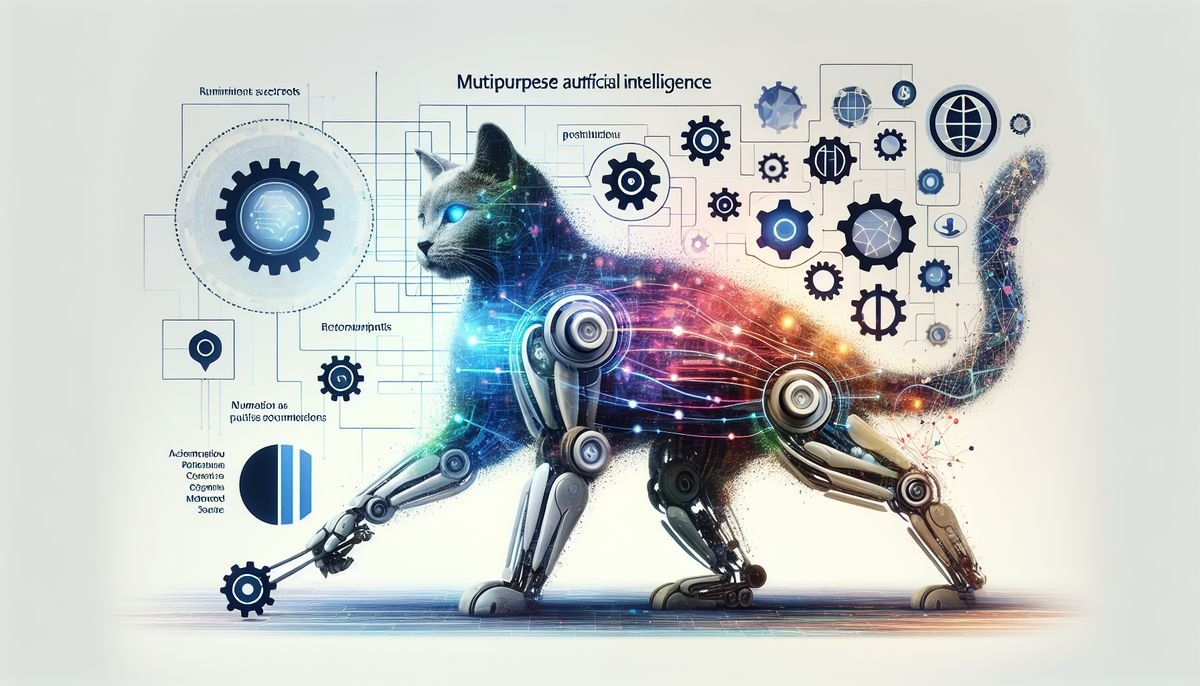DeepMind’s GATO represents a significant stride towards the development of Artificial General Intelligence (AGI), a field of study that aims to create systems capable of understanding, learning, and applying knowledge across a wide range of tasks. As businesses look to stay ahead of the curve, GATO’s multi-tasking abilities offer a glimpse into the future of AI applications in various sectors. This article explores the potential of GATO to revolutionize business operations, providing insights into its capabilities and practical guidance for integration.
Key Takeaways
- GATO by DeepMind is a versatile AI system that can perform over 600 tasks, demonstrating a substantial advancement towards AGI.
- The implementation of GATO in business can enhance efficiency, drive innovation, and offer competitive advantages across multiple industries.
- Understanding and leveraging GATO’s capabilities requires strategic integration and foresight to future-proof business operations in an ever-evolving AI landscape.
Exploring DeepMind’s GATO: A Leap Towards Artificial General Intelligence
Understanding GATO’s Multi-Tasking Capabilities
DeepMind’s GATO represents a significant stride in the realm of AI, showcasing an ability to perform a multitude of tasks with a single, unified model. GATO’s versatility is not just theoretical; it’s a practical tool that can adapt to over 600 different tasks, ranging from language processing to complex strategic games. This multi-tasking capability is a leap towards the concept of Artificial General Intelligence (AGI), where an AI system can handle a variety of challenges without needing task-specific programming.
One of the most recent and relevant examples of GATO’s capabilities is its proficiency in 3D world tasks. Researchers have demonstrated that a generalist agent like GATO can excel in these environments by fine-tuning large language models (LLMs) with object-centric multi-modal representations. This approach allows GATO to understand and interact with 3D spaces in a way that was previously the domain of more specialized models.
The impact of GATO’s multi-tasking abilities is far-reaching. For instance, consider the following sectors where GATO’s adaptability could be transformative:
- Healthcare: Assisting in diagnosis and patient care management.
- Finance: Analyzing market trends and managing risk.
- Manufacturing: Optimizing supply chains and predictive maintenance.
- Education: Personalizing learning experiences and automating administrative tasks.
The promise of GATO is not just in its current capabilities, but in its potential to continuously learn and adapt, making it an invaluable asset for any business looking to stay ahead in a rapidly evolving technological landscape.
The Significance of GATO in Modern AI Research
DeepMind’s GATO represents a significant milestone in the quest for Artificial General Intelligence (AGI), a long-sought goal in the AI community. GATO’s ability to perform over 600 tasks is not just a technical achievement; it’s a conceptual breakthrough. This versatility challenges the traditional AI paradigm of creating specialized systems for narrow tasks, suggesting a future where a single AI can adapt to a multitude of roles.
The development of GATO has sparked discussions among experts about the potential and direction of AGI. For instance, Demis Hassabis, co-founder of DeepMind, has been vocal about the transformative impact of such technologies. GATO’s multi-tasking capabilities have been compared to OpenAI’s rumored new Q* model, which also aims to demonstrate a breadth of abilities, from playing video games to manipulating objects with a robotic arm.
In the context of modern AI research, GATO’s design philosophy aligns with the broader industry trend towards more flexible and general-purpose AI systems. This shift is evident in the recent advancements and experiments with models like GPT-4, which have demonstrated proficiency in a range of complex tasks, including passing various difficult exams.
The implications of GATO’s success are profound, hinting at a future where AI can seamlessly transition between tasks, much like a human worker. This adaptability could revolutionize how businesses operate, offering unprecedented efficiency and innovation.
Practical Applications of GATO Across Industries
DeepMind’s GATO represents a significant stride in the realm of artificial general intelligence (AGI), with its ability to perform over 600 different tasks. This versatility makes GATO an invaluable asset across various business sectors, offering a glimpse into the future of AI’s role in industry.
One of the most compelling applications of GATO is in the healthcare sector. By leveraging its multi-tasking capabilities, GATO can assist in diagnosing diseases, personalizing treatment plans, and even supporting mental health services. Its adaptability ensures that it can keep pace with the rapidly evolving medical field, providing support where it’s most needed.
In the creative industries, GATO’s potential is equally transformative. From generating original artwork to composing music, GATO can augment human creativity, opening up new possibilities for artists and designers. Its ability to understand and manipulate complex patterns allows it to contribute meaningfully to these highly nuanced fields.
The integration of GATO into business operations is not just about automation; it’s about enhancing human expertise with advanced AI insights.
As businesses look to the future, the adaptability of GATO positions it as a key player in driving innovation and maintaining competitive advantage. Its continuous learning capabilities mean that it can evolve alongside the business, ensuring that operations remain cutting-edge and efficient.
Implementing GATO in Business: A Guide to Leveraging AI
Integrating GATO into Your Business Operations
As AI infiltrated the workplace, businesses are recognizing the urgency to adapt to the evolving technological landscape. DeepMind’s GATO, a multipurpose AI, stands at the forefront of this transformation, offering a versatile toolset for a wide array of business functions.
To effectively integrate GATO into your operations, consider the following steps:
- Identify the business areas that would benefit most from AI assistance.
- Assess the compatibility of GATO with your existing systems and workflows.
- Develop a strategic plan for phased implementation, ensuring minimal disruption.
- Train your staff to work alongside GATO, emphasizing the enhancement of their roles rather than replacement.
- Continuously monitor and adjust the integration process based on performance metrics and feedback.
By leveraging GATO’s adaptive learning capabilities, businesses can not only streamline their operations but also foster innovation and growth. The key is to embrace AI as a partner that complements human expertise, not one that competes with it.
With GATO’s ability to handle multiple modalities seamlessly, it becomes an invaluable asset in areas such as customer service, data analysis, and even creative tasks. The potential for GATO to revolutionize business operations is immense, provided that companies approach its integration thoughtfully and strategically.
Case Studies: Successful Deployments of GATO in Various Sectors
DeepMind’s GATO has been making waves across various industries, showcasing its versatility and power. One notable deployment is within Google’s ecosystem, where GATO has been instrumental in optimizing computer systems, including the renowned projects MuZero, AlphaZero, and AlphaDev. This integration has been pivotal in enhancing products used by billions, aligning with DeepMind’s mission to advance AI for widespread benefit.
Another groundbreaking application of GATO is in the realm of campus management. Educational institutions are leveraging the power of digital twins, a virtual representation of physical environments, to analyze and improve campus dynamics. By coupling digital twins with GATO’s AI capabilities, colleges are finding innovative ways to manage and evolve their campus environments.
The adaptability of GATO to various tasks and environments underscores its potential as a transformative tool in business sectors seeking to harness the power of AI.
The following table highlights some of the sectors where GATO has been successfully implemented, demonstrating its broad applicability and the tangible benefits it brings to each domain:
Future-Proofing Your Business with GATO’s Adaptive Learning
In the rapidly evolving landscape of artificial intelligence, DeepMind’s GATO stands out as a beacon of adaptability, offering businesses a way to stay ahead of the curve. GATO’s ability to perform over 600 different tasks not only showcases its versatility but also its potential to evolve with the changing demands of various industries.
The concept of Artificial General Intelligence (AGI) has been a focal point in recent AI discussions, with GATO being a step towards this ambitious goal. AGI systems are designed to understand, learn, and apply knowledge in a way that is indistinguishable from human intelligence. By integrating GATO into your business operations, you are essentially harnessing a form of AGI that can adapt and excel in a multitude of tasks, from customer service to complex problem-solving.
To illustrate the transformative impact of GATO, consider the following points:
- Enhanced Learning and Development: GATO can revolutionize workplace learning by implementing next-gen learning simulations and advanced experiential learning solutions.
- Dynamic Decision-Making: With its capacity for learning, perception, reasoning, and decision-making, GATO can provide businesses with a powerful tool for making informed decisions.
- Scalability and Flexibility: As your business grows, GATO’s multi-tasking capabilities allow it to scale alongside, adapting to new challenges and opportunities.
By investing in GATO’s adaptive learning technology, businesses can ensure that they are not only keeping pace with current trends but are also prepared for future advancements in AI.
Conclusion
DeepMind’s GATO represents a significant leap forward in the realm of artificial intelligence, showcasing the potential of general-purpose AI systems. With its ability to perform over 600 tasks, GATO exemplifies the versatility and adaptability that modern businesses crave. From automating complex workflows to enhancing decision-making processes, GATO’s multi-tasking capabilities can be leveraged across various sectors to drive innovation and efficiency. As we continue to explore the boundaries of AI, tools like GATO not only push the envelope in technological advancement but also offer a glimpse into a future where AI can seamlessly integrate into every facet of business operations. The implications for growth, productivity, and competitive advantage are vast, making GATO a harbinger of the transformative power of Artificial General Intelligence in the business world.
Frequently Asked Questions
What is DeepMind’s GATO and what makes it unique in the AI landscape?
GATO is a ‘general-purpose’ AI system developed by DeepMind, capable of performing over 600 different tasks, including playing games and controlling robots. Its uniqueness lies in its multi-tasking capabilities, which represent a step towards Artificial General Intelligence (AGI), where a single system can adapt and apply its learning to a wide variety of challenges.
How can GATO be applied in different business sectors?
GATO’s versatility allows it to be applied across various industries, from automating complex operations in manufacturing to enhancing customer service with sophisticated chatbots. It can also support healthcare through predictive analytics and assist in financial services by analyzing large datasets for insights.
What are the potential benefits of integrating GATO into a business?
Integrating GATO into business operations can lead to increased efficiency, reduced costs, and improved decision-making through data-driven insights. Its ability to learn and adapt to new tasks also means that businesses can stay ahead of the curve by leveraging the latest AI technology for continuous improvement.



